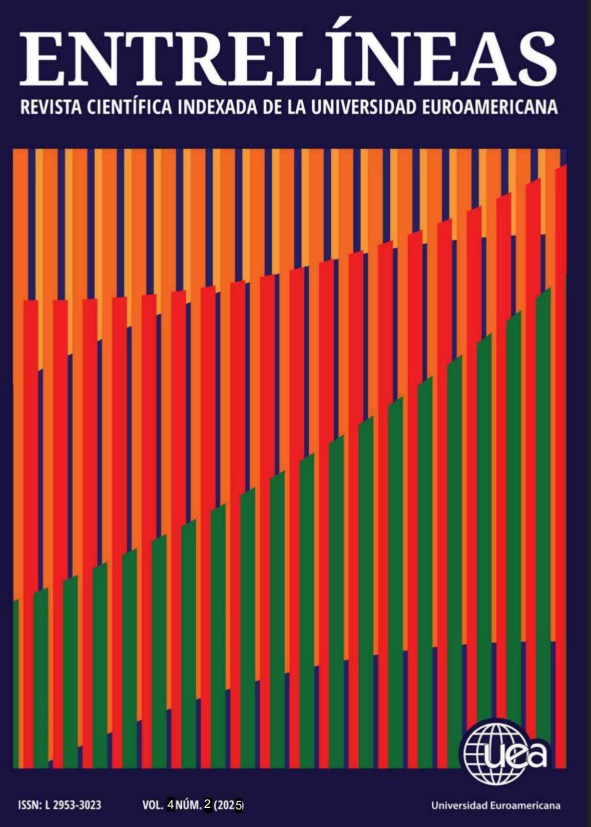The role of financial accounting in the detection of corporate fraud
DOI:
https://doi.org/10.56368/Entrelineas421Keywords:
financial accounting, corporate fraud, professional ethicsAbstract
Corporate fraud is a criminal activity that involves the manipulation of financial or operational information. In this context, financial accounting, traditionally associated with the objective presentation of the economic situation, serves to identify signs that warn of the possible presence of fraud. The main objective of this study is to determine the contribution of financial accounting in the detection of fraudulent practices in the corporate sphere. The research was conducted through qualitative study and the document analysis method to review, interpret, and construct the topic. Forty-one relevant sources were selected from a total of 78 identified documents, based on their thematic relevance and relevance, to develop points such as accounting indicators, applied technologies, and weaknesses in the preventive system. The most important result was that, while there is no single, infallible accounting indicator to predict fraud in financial statements, the contextualized combination of certain accounting data, such as financial ratios and cash flow analysis, with a professional perspective is important for establishing early warning systems. The most important conclusion is that, although financial accounting has significant potential for early fraud detection, its effectiveness depends on overcoming technological obstacles, strengthening an ethical and control-based organizational culture, and ensuring the independence of the accountant.
Downloads
References
ACFE. (2024). Occupational fraud 2024: a report to the nations. ACFE. https://www.acfe.com/-/media/files/acfe/pdfs/rttn/2024/2024-report-to-the-nations.pdf
Albrecht, W. S., Albrecht, C. O., Albrecht, C. C., & Zimbelman, M. F. (2019). Fraud examination (p. 696). Thomson South-Western.
Batista Peralta, D. R. (2025). Función descriptiva de la auditoría en la valoración del control interno y el modelo COSO. Revista Científica del Istmo, 2(1), 94-104. https://ojs.udelistmo.edu/index.php/revistacientificadelistmo/article/view/29/28
Bazerman, M. H., Loewenstein, G., & Moore, D. A. (2002). Why good accountants do bad audits. Harvard Business Review, 80(11), 96-103. https://www.andrew.cmu.edu/user/gl20/GeorgeLoewenstein/Papers_files/pdf/WhyGoodAccountants.pdf
Beckham, H. W. (2021). Financial Ratios. In EBSCO, Research Starters. https://www.ebsco.com/research-starters/business-and-management/financial-ratios
Benet Rodríguez, M., Zafra, S. L., & Quintero Ortega, S. P. (2015). La revisión sistemática de la literatura científica y la necesidad de visualizar los resultados de las investigaciones. Revista Logos, Ciencia & Tecnología, 7(1), 101-103. https://www.redalyc.org/pdf/5177/517751487013.pdf
Bhattacharya, S. & Bhattacharya, S. (2020). Detection of Corporate Frauds. SSRN, 1-8. http://dx.doi.org/10.2139/ssrn.3629175
Blazek, R., & Duricova, L. (2025). Beyond Expectations: Anomalies in Financial Statements and Their Application in Modelling. Stats, 8(3), 63. https://doi.org/10.3390/stats8030063
Bowen, G. A. (2009). Document analysis as a qualitative research method. Qualitative research journal, 9(2), 27-40. https://n9.cl/btnvd
Cadavid Acevedo, M. D. (2017). Aspectos fundamentales de prevención de fraude. https://n9.cl/wqmh9
Castillo Castillo, G. M. & Ramírez Huerta, J. R. F. (2025). La inteligencia artificial en la investigación contable: una herramienta para la detección de fraude y errores. Comisión Técnica de Investigación Contable de la Asociación Interamericana de Contabilidad-AIC, 1-7. https://contadores-aic.org/wp-content/uploads/2025/01/02-La-Inteligencia-Artificial-en-la-Investigacion-Contable-Una-Herramienta-para-la-Deteccion-de-Fraude-y-Errores.pdf
Católico Segura, D. F. (2021). Las Normas Internacionales de Información Financiera y su relevancia informativa: evidencia empírica en empresas cotizadas de Colombia. Contaduría y Administración, 66(2), 1-33. https://doi.org/10.22201/fca.24488410e.2021.2395
Cattani, A. D. (2009). Fraudes corporativos y apropiación de la riqueza. Convergencia, 16(51), 59-84. https://n9.cl/awbk0
Corbin, J., & Strauss, A. (1998). Basics of qualitative research: Techniques and procedures for developing grounded theory. Sage publications.
Cornejo-Saavedra, E. E. (2018). Earnings management para evitar reportar pérdidas: Chile, 2010-2014. Journal of Economics, Finance and Administrative Science, 23(45), 167-181. https://doi.org/10.1108/JEFAS-11-2017-0107
Corpas, M., Mena, T., & Carrizo, R. (2019). La decencia y el decoro en la gestión pública opacada por el fraude financiero en Panamá. Revista FAECO Sapiens, 2(2), 118-122. https://n9.cl/rf2nv
Duan, Y., & Qiao, G. (2024). Detecting financial statements fraud: Evidence from listed companies in China. Sustainable Economies, 2(4),1-14. https://doi.org/10.62617/se.v2i4.301
Erazo-Luzuriaga, A. F. (2023). Uso de la minería de datos para la prevención de fraudes en el sector financiero. Horizon Nexus Journal, 1(1), 63-76. https://doi.org/10.70881/hnj/v1/n1/13
Galvis-Castañeda, I. E., & Santos-Mera, J. E. (2017). Geometría del fraude. Cuadernos de Contabilidad, 18(45), 74-85. https://doi.org/10.11144/javeriana.cc18-45.geof
García Somolinos, R. (2023). Estudio del escándalo de fraude de un minorista del sector alimentario. [Tesis de Licenciatura]. Universitat Politècnica de València)
Guallpa Uzhca, M. A. (2022). El control financiero en las pequeñas y medianas empresas. [Tesis de Licenciatura]. Universidad Católica de Azogues.
Isoré Gutiérrez, F. A. (2020). El fraude corporativo y las buenas prácticas para su efectivo tratamiento. Derecho & Sociedad, (55), 491-502. https://revistas.pucp.edu.pe/index.php/derechoysociedad/article/view/23263/22249
KFORD Group (2022). Using the Statement of Cash Flows to Spot Fraud. In The KFORD Group, Certified Public Accountants. https://thekfordgroup.com/using-the-statement-of-cash-flows-to-spot-fraud/
Kureljusic, M., & Karger, E. (2023). Forecasting in financial accounting with artificial intelligence–A systematic literature review and future research agenda. Journal of Applied Accounting Research, 25(1), 81-104. https://doi.org/10.1108/JAAR-06-2022-0146
Ley 23 de 2015. Que adopta medidas para prevenir el blanqueo de capitales, el financiamiento del terrorismo y el financiamiento de la proliferación de armas de destrucción masiva, y dicta otras disposiciones. 27 de abril de 2015. Gaceta Oficial No 27768-B.
Mariscal, L. Z. (2016). Señales de alerta para la detección de fraude en las empresas. Revista de Contabilidad y Dirección, 23, 61-81. https://n9.cl/rbcp6
Martínez Fallas, L. (2015). Implementación de la auditoría continua automatizada mediante el uso de las herramientas tecnológicas Caseware Idea® y Caseware Monitor. [Tesis de Maestría]. Universidad de Costa Rica.
Muñiz, A. C., Maillard, F. H., & Prado, A. L. (2018). Auditoría de estados financieros y su documentación: con énfasis en riesgos. IMCP.
Murphy, D. S. (2017). El uso de la Ley de Benford para detectar fraude en los estados financieros. En Díaz Becerra, O. A & Dextre Flores, J. C., Ciencia contable: visión y perspectiva (59-70). Pontificia Universidad Católica del Perú, Fondo Editorial.
Ortiz, J. C., Rodríguez Díaz, D. A., Amador Rosales, C. A., & Reyes Jordán, L. (2025). Desarrollo de un modelo predictivo de rentabilidad empresarial en empresas de la cadena alimentaria del Huila mediante el análisis de variables financieras y tendencias del mercado regional. [Seminario de Investigación]. EAN Universidad.
Oviedo Espinola, D. L., Robi, I. G. & Robi, G. M. (2025). El nuevo rol del contador público ante el avance de la inteligencia artificial y los medios digitales. [Tesis de Licenciatura]. Universidad Nacional de San Martín.
Padilla Vergara, T., Llanos-Ayola, J. R., Puche Urrego, M. P., Urango Rivero, T. R. & Nieves Garces, D. S. (2025). La ética profesional en la formación académica del contador público en Montería, Córdoba. Ciencia y Reflexión, 4(2), 1118-1138. https://doi.org/10.70747/cr.v4i2.313
Palepu, K. G., Healy, P. M., Wright, S., Bradbury, M., & Coulton, J. (2020). Business analysis and valuation: Using financial statements. Cengage AU.
Pinda Guanolema, B. R. (2019). Globalización financiera y regulación contable internacional: estandarización de la información desde el nuevo marco conceptual. Aldea Mundo, 24(48), 9-22. https://www.redalyc.org/journal/543/54364091002/54364091002.pdf
Pinilla Bedoya, J., & Álvarez Arroyave, J. (2013). Del Contador Público y la ética profesional: un dilema inmerso en un ambiente saturado de conflictos morales. Contaduría Universidad de Antioquia, 63, 127-158. https://bibliotecadigital.udea.edu.co/server/api/core/bitstreams/45d0159f-90f1-46de-be99-5ede28c7b841/content
Rengifo Millán, M. & Cortez Guevara, A. M. (2023). El control interno, riesgos del fraude y avances en la responsabilidad social empresarial: estudios en pymes de América Latina y el Caribe. Universidad del Valle.
Rezaee, Z. (2005). Causes, consequences, and deterence of financial statement fraud. Critical perspectives on Accounting, 16(3), 277-298. https://doi.org/10.1016/S1045-2354(03)00072-8
Shaleh, M. (2024). The transformative implications of technology on accounting practices. Advances in Management & Financial Reporting, 2(2), 98-109. https://doi.org/10.60079/amfr.v2i2.278
Singleton, T. W., & Singleton, A. J. (2010). Fraud auditing and forensic accounting. John Wiley & Sons. https://n9.cl/1uae1a
Tafur Sánchez, B. E., Acosta Ordóñez, J., & Sepúlveda Ortiz, P. A. (2025). Resistencia en la adopción de digitalización financiera en empresas medianas y pequeñas en Colombia. [Tesis de Especialización]. Universidad La Gran Colombia.
Valladares-Albarracín, J. J., & Ordóñez-Parra, Y. L. (2024). La aplicación de inteligencia artificial en la auditoría. Revista Multidisciplinaria Perspectivas Investigativas, 4(esp.), 73-85. https://doi.org/10.62574/rmpi.v4iespecial.172
Wanden-Berghe Fajardo, C. A. (2023). Blockchain e inteligencia artificial en el sistema de información contable: la disrupción de la partida triple. [Tesis de Licenciatura]. Universidad de Alicante.
Wells, J. T. (2017). Corporate fraud handbook: Prevention and detection. John Wiley & Sons. https://download.e-bookshelf.de/download/0003/9354/53/L-G-0003935453-0002444828.pdf
Downloads
Published
Issue
Section
License

This work is licensed under a Creative Commons Attribution-NonCommercial 4.0 International License.
You are free to:
- Share — copy and redistribute the material in any medium or format
- Adapt — remix, transform, and build upon the material
- The licensor cannot revoke these freedoms as long as you follow the license terms.
Under the following terms:
- Attribution — You must give appropriate credit , provide a link to the license, and indicate if changes were made . You may do so in any reasonable manner, but not in any way that suggests the licensor endorses you or your use.
- NonCommercial — You may not use the material for commercial purposes .
- No additional restrictions — You may not apply legal terms or technological measures that legally restrict others from doing anything the license permits.










